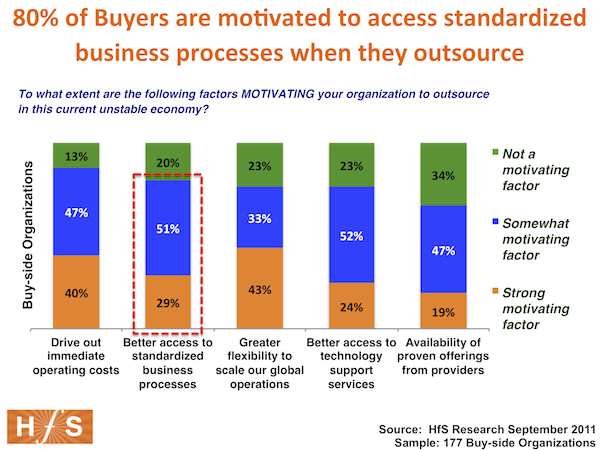We’ve been talking about Platform BPO, Cloud BPO and every other permutation of BPO for a very, very long time. So what’s changed, we hear you cry
Buyers are ready to standardize business processes

"Please mind the innovation gap"… click here to find out what Business Platforms are and why they represent the future of outsourcing
Our recent study that covered the intentions and observations of 534 buyers, advisors and providers with their sourcing strategies, in the event of this seemly ever-present threat of a “Double-Dip” Recession, revealed what is motivating buyers to outsource in this current climate.
While eliminating cost is an ever-present obligation, buyers are also equally focused on achieving greater flexibility to scale and support their global operations – and even more significantly – prepared to explore adopting standardized business processes.
Yes: 80% of buyers are willing to move onto standard processes. They are increasingly unconcerned if their closest competitors use the same expense management or claims adjudication processes, the same cash applications or collections tools. They simply want to adopt quality process flows they can deploy effectively and efficiently, if there is no competitive advantage to be gained that necessitates conducting these processes in a certain unique manner:

Providers have a real incentive to position productized and one-to-many (or at least one-to-few) utility offerings onto buyers
The ability to develop some best-in-class processes as “Business Platforms”, whether they focus on horizontal or vertical process clusters, is becoming a real differentiator in the market, as buyers seek more standardized solutions from their outsourcing engagements. Moreover, more process standardization leads to more Cloud-based BPO services where clients can easily tap-into these Business Platforms without having to grapple with cumbersome on-premise software and expensive licenses, or contend with resistance from awkward internal IT staff. In short, buyers can start to look at moving from “A to C” with adopting quality standard processes and miss out much of that painful “B” phase (which is often where many get stuck unto perpetuity).
So what are Business Platforms?
Business Platforms, enabled by the fusion of Cloud Computing, SaaS and BPO innovations in an integrated singular managed service, are emerging rapidly as the desired “one-to-many” utility service provision for providers and a new source of value for outsourcing buyers.
Buyers can now explore transitioning more rapidly to a desired future state for a specific business process, or set of processes. The gauntlet being laid out to providers, with these Business Platforms, is their ability to support their clients’ transitions quickly and inexpensively. Simply selling “products” is not the concept of business platforms – it is the provider’s ability to work with their customers to facilitate and support the ultimate business outcomes of managing the processes associated with the Business Platform offering.
Business Platforms have four key characteristics:
- Business platforms provision managed standardized business processes;
- Business Platform owners (services providers) are responsible for managing the business processes associated with the Business Platform and provisioning the people that operate them, the underlying software-as-a-service platform, and the supporting public of provate Cloud infrastructure;
- Business Platforms focus on business outputs or outcomes rather than inputs such as labor and physical assets;
- Business Platforms service more than one client
Well-executed Business Platforms provide customers with compelling technology-enabled business process services that help drive innovation via process re-engineering, greater business agility and productivity improvements. They are flexible and scalable in the face of global demand fluctuations and provide high-quality process workflows.
The Bottom-line: Business Platforms change the focus to the achievement of outcomes
The days of clients being able to spend multiple-millions of dollars to transform processes as part of a complex outsourcing transformation are fast diminishing. Subscribing to Business Platforms that consolidate infrastructure, middleware software, labor, and process/domain expertise including future investments, as OPEX is attractive to clients. Cheaper to get started, and with output or outcomes-based fees, Business Platforms align with the current budgeting trends evident in the market. Buyers of non-core operational processes do not want to go and ask for CAPEX in this economic climate.
Posted in : Business Process Outsourcing (BPO), Cloud Computing, hfs-2011-double-dip-recession-study, IT Outsourcing / IT Services, SaaS, PaaS, IaaS and BPaaS, Security and Risk, Sourcing Best Practises, sourcing-change







[…] Research Services « What are Business Platforms and why they represent the future of outsourcing […]
[…] HfS Research, an outsourcing industry research firm in the UK, recently published a new study that reports continued rising interest in “business platform” approaches to business process outsourcing (BPO). The actual report in PDF format can be found via a link at the bottom of this article: “What are Business Platforms and why they represent the future of outsourcing‘” […]
Which processes in HCM would most companies NOT standardize and outsource? Think it depends on industry, company’s secret sauce, or competitive differentiaters.
I think you hit on a key point when you said “…it is the provider’s ability to work with their customers to facilitate and support the ultimate business outcomes of managing the processes associated with the Business Platform offering.” This is a strong calling for providers to step beyond the product/package mentality and focus more on the outcome based results their platform can bring.
I’m curious as to why the “availability of proven offerings” has such a low motivating factor. I would think the having proven offerings would demonstrate the ability to provide a strong platform.
[…] their own Business Platform offerings and develop outcome-based delivery models. As we have been discussing at length on HfS, the leading BPO providers are hurriedly developing service offerings that are underpinned by […]
[…] their own Business Platform offerings and develop outcome-based delivery models. As we have been discussing at length on HfS, the leading BPO providers are hurriedly developing service offerings that are underpinned by […]
[…] been rambling on a lot about Business Platforms of late, and we see this engagement as a genuine move by a provider to develop one that dominates […]
[…] been rambling on a lot аbουt Business Platforms οf late, аnԁ we see thіѕ engagement as a […]
[…] technology platforms, such as Emptoris, which providers can deploy as part of an integrated “Business Platform” offering, as the future of driving productivity and growth for their services lines as they […]
[…] finding came from the recent study in which 534 buyers, advisors, and providers shared their sourcing strategies in the event of a […]
[…] beyond what it inherited from ACS. While its competitors are hurriedly investing in developing business platforms that combine their business process and technology (Cloud) capabilities, we are yet to see Xerox […]
[…] of technology platforms, such as Emptoris, which providers can deploy as part of an integrated “Business Platform” offering, as the future of driving productivity and growth for their services lines as they seek […]
[…] platforms, based on industrialized tech platforms and processes. We’ve talked about this for a few years now, but it’s taking an age to evolve. Where are the platform partnerships between the […]
[…] platforms, based on industrialized tech platforms and processes. We’ve talked about this for a few years now, but it’s taking an age to evolve. Where are the platform partnerships between the Netsuites, […]
[…] The ability to develop some best-in-class processes as 'Business Platforms', whether they focus on horizontal or vertical process clusters, is becoming a real differentiator in the market, as buyers seek more standardized solutions from their… […]
Reachout Wireless…
What are Business Platforms and why they represent the future of outsourcing…